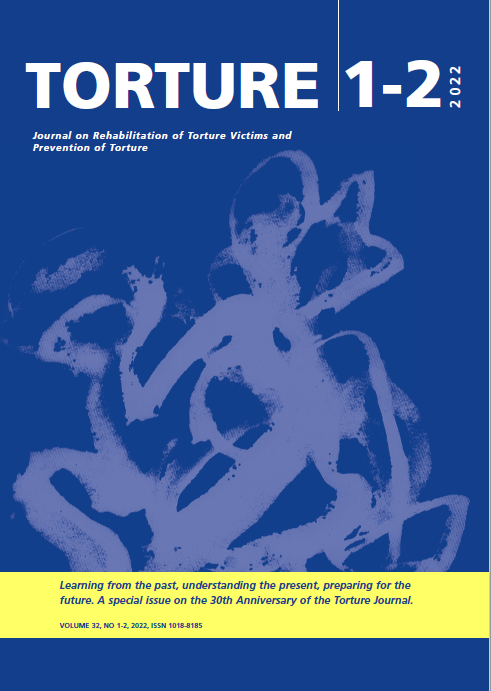Operational psychology, professional ethics, and democracy: A challenge for our time
DOI:
https://doi.org/10.7146/torture.v32i1-2.131536Keywords:
Operational psychology, Torture, Interrogations, Ethics, Psychological ethics, Dual relationships, Torture JournalAbstract
The post-9/11 US torture program brought attention to the critical roles of health professionals generally and of psychologists more particularly in the modern administration of torture. Over a decade of controversy in the American Psychological Association (APA) and an independent investigation finding APA collusion with the Bush administration’s torture and coercive interrogation programs led to 2015 policies restricting the activities of psychologists in national security interrogations and illegal detention sites like Guantanamo. This controversy expanded to evaluation of a broader set of issues regarding the ethical roles of psychologists in furthering military and intelligence operations, or what has become known as operational psychology. Controversy over the extent to which operational psychology activities are consistent with psychological ethics has expanded since 2015 with critics calling for policies restraining operational psychologists from involvement in activities that cause greater than trivial unstipulated harm, lack informed consent, or are absent plausible independent ethical monitoring (due, for instance to information classification). Operational psychologists have pushed back against any constraints on their actions other than US law and government regulations. This debate also raises a broader issue, are there limitations on the extent to which we as members of democratic societies can tolerate the use of psychological science and expertise to manipulate unwitting people?
References
Aldhous, P. (2015a, August 5). Psychology Is In Crisis Over Role In Bush-Era Torture. Buzzfeed. https://www.buzzfeednews.com/article/peteraldhous/psychologists-grapple-with-torture
Aldhous, P. (2015b, August 7). How six rebel psychologists fought a decade-long war on torture—And won. Buzzfeed. https://www.buzzfeednews.com/article/peteraldhous/the-dissidents?
Aldhous, P. (2018, July 26). Psychologists are in a nasty fight about a report on torture. Buzzfeed. https://www.buzzfeednews.com/article/peteraldhous/psychology-torture-guantanamo-interrogation
American Psychological Association. (2015). APA’s Council Bans Psychologist Participation in National Security Interrogations. American Psychological Association. http://www.apa.org/news/press/releases/2015/08/psychologist-interrogations.aspx
Arrigo, J. M., Eidelson, R. J., & Bennett, R. (2012). Psychology under fire: Adversarial operational psychology and psychological ethics. Peace and Conflict: Journal of Peace Psychology, 18(4), 384.
Berkun, M. M. (1964). Performance decrement under psychological stress. Human Factors, 6(1), 21–30. https://doi.org/10.1177/001872086400600104
Capshew, J. H. (1999). Psychologists on the march: Science, practice, and professional identity in America, 1929-1969. Cambridge University Press.
Central Intelligence Agency. (1963, July). KUBARK counterintelligence interrogation. http://www.gwu.edu/~nsarchiv/NSAEBB/NSAEBB122/#kubark
Greenfield, P. (1977). CIA’s behavior caper. APA Monitor, 1, 10–11.
Harvey, S. C. (2015, October 17). Response to the “Brookline Principles on the Ethical Practice of Operational Psychology.” PsychCoalition. http://psychcoalition.org/hoffman-report-articles/response-to-brookline
Hoffman, D. H., Carter, D. J., Lopez, C. R. V., Benzmiller, H. L., Latifi, S. Y., & Craig, D. C. (2015). Report to the Special Committee of the Board of Directors of the American Psychological Association: Independent review relating to APA ethics guidelines, national security interrogations, and torture (p. 542). Sidley Austin, LLP. http://www.apa.org/independent-review/revised-report.pdf
Kinzer, S. (2019). Poisoner in chief: Sidney Gottlieb and the CIA search for mind control. Henry Holt.
Marks, J. D. (1991). The search for the “Manchurian candidate.” Norton.
Office of Medical Services, Central Intelligence Agency. (2007). Summary and reflections of Chief of Medical Services on OMS participation in the RDI program. Central Intelligence Agency. https://www.aclu.org/sites/default/files/field_document/oms_summary.pdf
Operational Psychology Practice Guidelines Task Force (OPPG TF). (2022). Site85_Proposed Guidelines for Operational Psychology (DraftLined) (1).pdf. American Psychological Association. https://apps.apa.org/CommentCentral2/attachments/Site85_Proposed%20Guidelines%20for%20Operational%20Psychology%20(DraftLined)%20(1).pdf
Reisner, S. (2017). Response to APA ethics compaint. https://www.documentcloud.org/documents/4618723-REISNER-Response-to-Op-Psych-Ethics-Complaint.html
Senate Select Committee on Intelligence. (2014). Committee study of the Central Intelligence Agency’s detention and interrogation program (p. 525). Senate Select Committee on Intelligence. http://www.feinstein.senate.gov/public/index.cfm/files/serve?File_id=7c85429a-ec38-4bb5-968f-289799bf6d0e&SK=D500C4EBC500E1D256BA519211895909
Soldz, S., Arrigo, J. M., Frakt, D. J. R., & Olson, B. (2018a). Response to Staal: “Psychological ethics and operational psychology”—Fundamental issues and methods. Peace and Conflict, 24(4), 448–456. http://dx.doi.org/10.1037/pac0000330
Soldz, S., Arrigo, J. M., Frakt, D. J. R., & Olson, B. (2018b). Second response to Staal: Independent moral assessment, an essential requirement for ethical practice in operational psychology. Peace and Conflict, 24(4), 460–463. http://dx.doi.org/10.1037/pac0000331
Soldz, S., Olson, B., & Arrigo, J. M. (2017). Interrogating the ethics of operational psychology. Journal of Community & Applied Social Psychology, 27(4), 273–286. https://doi.org/10.1002/casp.2321
Staal, M. A. (2018a). Applied psychology under attack: A response to the Brookline Principles. Peace and Conflict, 24(4), 439–447. http://dx.doi.org/10.1037/pac0000333
Staal, M. A. (2018b). Lies, statistics, and Brookline: A Response to Soldz, Arrigo, Frakt, & Olson. Peace and Conflict, 24(4), 457–459. http://dx.doi.org/10.1037/pac0000332
The Nuremberg Code (1947). (1996). BMJ, 313(7070), 1448. https://doi.org/10.1136/bmj.313.7070.1448
Tjeltveit, A. (1999). Ethics and values in psychotherapy (1st ed.). Routledge.
United Nations General Assembly. (1984). Convention against Torture and Other Cruel, Inhuman or Degrading Treatment or Punishment. United Nations. http://www.ohchr.org/Documents/ProfessionalInterest/cat.pdf
Williams, T. J. (2019). Foreword. In M. A. Staal & S. C. Harvey (Eds.), Operational psychology: A new field to support national security and public safety (pp. ix–xii). ABC-CLIO.

Downloads
Published
How to Cite
Issue
Section
License
Copyright (c) 2022 Torture Journal

This work is licensed under a Creative Commons Attribution-NonCommercial-NoDerivatives 4.0 International License.
We accept that some authors (e.g. government employees in some countries) are unable to transfer copyright. The Creative Commons Licence Attribution-NonCommercial-NoDerivatives 4.0 International (CC BY-NC-ND 4.0) covers both the Torture Journal and the IRCT web site. The publisher will not put any limitation on the personal freedom of the author to use material contained in the paper in other works which may be published, provided that acknowledgement is made to the original place of publication.

